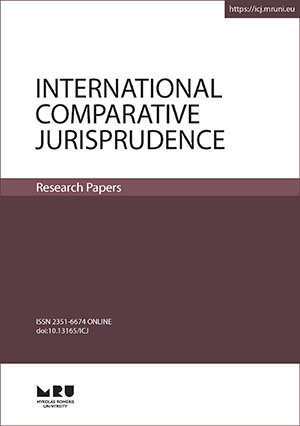THE POSSIBILITIES OF COMBATING SO-CALLED DISINFORMATION IN THE CONTEXT OF THE EUROPEAN UNION LEGAL FRAMEWORK AND OF CONSTITUTIONAL GUARANTEES OF FREEDOM OF EXPRESSION IN THE EUROPEAN UNION MEMBER STATES
THE POSSIBILITIES OF COMBATING SO-CALLED DISINFORMATION IN THE CONTEXT OF THE EUROPEAN UNION LEGAL FRAMEWORK AND OF CONSTITUTIONAL GUARANTEES OF FREEDOM OF EXPRESSION IN THE EUROPEAN UNION MEMBER STATES
Author(s): Jan KudrnaSubject(s): Communication studies, EU-Legislation
Published by: Mykolas Romeris University
Keywords: disinformation; freedom of expression; free access to information; restrictions; Internet;
Summary/Abstract: Freedom of expression and the right of access to and use of information are fundamental human rights that are crucial for the functioning of democracy but also, for example, for the exercise of freedom of thought and scientific research. At present, the public debate on the need to combat so-called disinformation, to create a legal framework for its suppression and, if necessary, even to punish it, including the application of criminal repression, has gained momentum. This complex topic is not only discussed at the national level – it is a global issue. The invasion of Ukraine by the Russian Federation has opened up discussions in this area with new intensity, both in the Member States of the European Union and in the Union itself. This is not a simple issue, because the fight against disinformation and fake news borders very closely on the issue of censorship. All these issues are the subject of the present article, which focuses on the law and decisions of the European Union, the Republic of Poland and the Czech Republic. Restricting and blocking selected websites for political reasons is new in the EU Member States. This is also why the necessary debate on the nature and permissibility of such measures has not yet developed. The present article aims to contribute to this discussion, both from a comparative point of view and by presenting the details of the legal regulation in the Czech Republic in the context of EU law and in comparison with the legal systems of selected member states of the European Union.
Journal: International Comparative Jurisprudence
- Issue Year: 8/2022
- Issue No: 2
- Page Range: 138-151
- Page Count: 14
- Language: English

